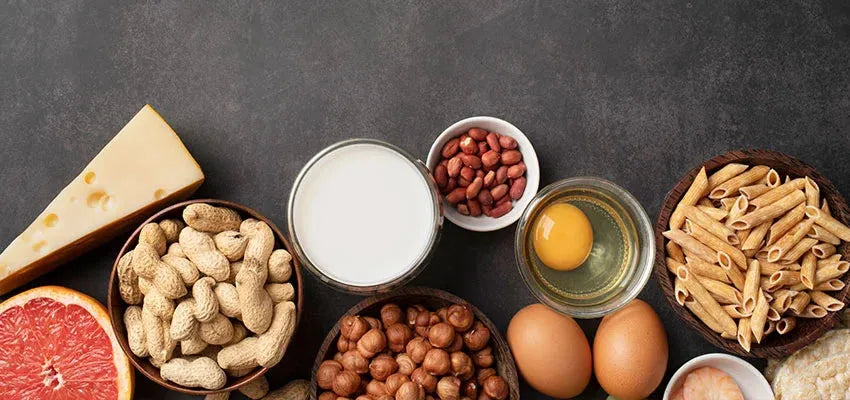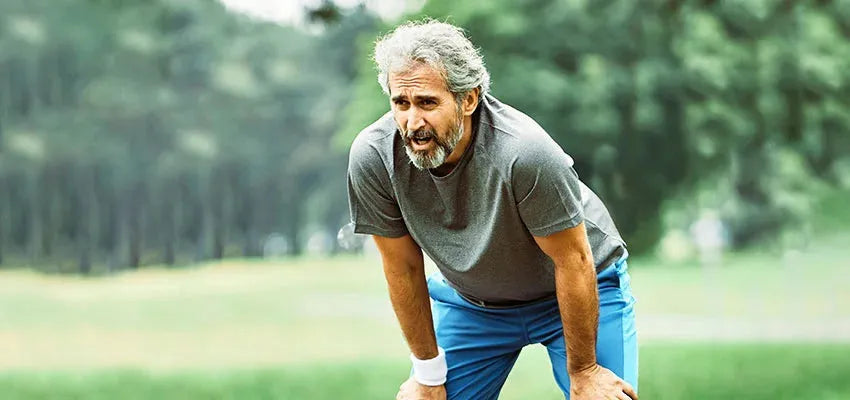
Which Protein to Take & Why at 45+
Aging is the gradual decline in an individual's physical and mental activities. Our muscular and bone strength gradually decreases as we age, eventually resulting in a weaker physique. This creates the need to overcome this deficiency and individuals start focusing on what protein they consume in their diet.
Proteins are the building blocks of amino acids. There are around 20 essential amino acids that interact in a unique way to produce hundreds of different proteins in our bodies. Proteins are required for the growth and maintenance of our body's cells and tissues. Any protein deficit in our bodies can have a direct impact on the aging process.
Functions of proteins
Proteins play a role in different bodily functions. These may be listed as given below:
- It provides structure and support to the body cells
- It serves as catalyst when facilitating an enzymatic chemical reaction in the body
- It supports the regulation and expression of DNA and RNA
- It helps muscles in their contraction and movement
- It provides support to the body
- It helps move essential molecules throughout the body
Types of proteins
There are 9 different types of proteins that play a vital role in body functions. They are:
- Enzymes – These help in the formation and breakdown of muscles in the body. These are necessary for growth, digestion, and catalysing a number of physiological processes. Without these enzyme proteins, the speed of chemical reactions in our body slows down and these processes are necessary for the smooth functioning of our body.
- Structural proteins – These help in strengthening the cells of tissues, muscles, and organs in our body.
- Signalling proteins – These help cells to communicate with each other. Signals, receptors, and relay proteins all work together to transport information from the outside of a cell to the inside.
- Regulatory proteins – These bind to DNA and regulate the turning on and off of the genes. Active genes are used in protein build-up.
- Transport proteins – These help to transport various molecules throughout the body.
- Sensory proteins – These help in the detection of heat, light, sound, touch, smell, taste, etc.
- Motor proteins – These help to move and change the shape of a cell.
- Defence proteins – These help to fight infections, heal damages, and evade predators.
- Storage proteins – These help in storing nutrients and energy-rich molecules for later use.
Effects on proteins as we age
Protein mass and function both drop as we age. This, in turn, will affect the physiological functions in our body that need proteins. This protein deficiency may make it difficult to maintain muscular mass, strength, and coordination, affecting bone health, and other physiological systems in our bodies.
Importance of proteins in middle-aged people
We require roughly 50% more protein as we get older to maintain muscle mass and strength for a better quality of life, in addition to quick recovery from infections and illnesses. People beyond 45 years of age are required to consume 1.2 grams of proteins per kilogram of their body weight in contrast to individuals below 45 years of age who require lesser amounts i.e., 0.8 grams per kilogram of their body weight daily. This additional protein consumption is essential to balance and sustain the body's demands and metabolism.
Tips to include proteins in diet:
Since foods are the major source of proteins, it is essential to keep a check on what one is eating after he/she reaches an age beyond 45 years. Food sources that are rich in proteins include:
Plant-based proteins – Cooked pulses (peas, beans, lentils, etc.), fruits (kiwi, avocado, grapes, bananas, guava, etc.)
Animal-based proteins – Eggs, milk, lean meat, poultry, fish, prawns, canned tuna, cheese, sardines, etc.
A few tips that can help one to meet their daily protein requirements include:
- Eat more dairy products – Dairy products such as milk, yogurt, ghee, cheese, etc., are excellent sources of proteins as well as other important nutrients such as iron, calcium, and vitamin D.
- Eat a variety of plant proteins – Plant products such as beans, legumes, chick peas, etc., are rich sources of proteins and fibres that are helpful in food digestion.
- Consume dry fruits – Dry fruits such as nuts and beans, cashews, figs, etc are rich sources of proteins that can help balance the protein intake in adult individuals.
- Include animal proteins in food – Animal proteins such as lean meat, chicken, fish, sardines, etc are highly recommended for individuals who have low protein in their diet to balance dietary protein needs of an individual.
- Try protein shakes – This is a quick and convenient way to get more proteins in your diet. To prepare a protein shake, blend fruits with milk or water and add one scoop of protein powder to it and consume.
- Include protein supplements in the diet – Supplements such as protein powders have become a popular nutritional supplement for athletes, older adults, and individuals who indulge in heavy exercises. These are quick and convenient options for the people who struggle to get enough protein through food alone. A few examples of protein powders that are available in the market easily include, whey, casein, and soy. The whey protein is most often recommended for individuals who reach the age of 45 years and beyond.
- Eat proteins before carbs – Eating protein before carbohydrates such as rice may help maintain healthy blood sugars in the body. According to few studies, eating proteins before carbohydrates helped post-meal insulin levels in diabetic individuals.
- Try including protein-rich foods in every meal - Including protein-rich foods in your diet will help you balance your daily protein requirement, thereby helping your body to function smoothly.
Proteins are essential components of our bodies that help in various body functions. A lack of this may result in a general weakening of the body's muscles and bones. Balance of proteins in one's diet is crucial for meeting bodily requirements, that in turn helps in the smooth functioning of body systems. However, it is recommended that one seek expert advice before making any major changes to their diet plan.


